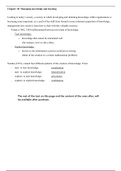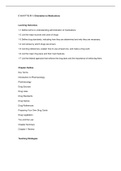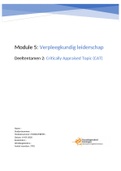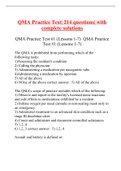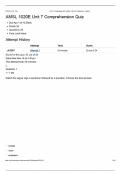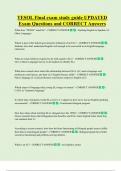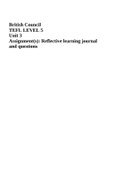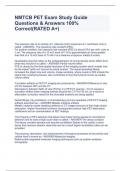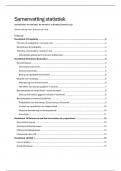Chapter 10: Managing knowledge and learning
Looking at today’s society, a society in which developing and obtaining knowledge within organizations is
becoming more important, as a result of the shift from formal to more informal acquisition of knowledge,
management now needs to learn how to deal with this valuable resource.
Polanyi (1962, 1983) differentiated between two kinds of knowledge.
- Tacit knowledge:
o knowledge that cannot be articulated well
(for instance: how to ride a bike).
- Explicit knowledge:
o known as the information a person could put in writing
(think of the solution to a certain mathematical problem).
Nonaka (1991), created four different patterns of the creation of knowledge. From:
- tacit- to tacit knowledge: socialization
- tacit- to explicit knowledge: internalization
- explicit- to tacit knowledge: articulation
- explicit- to explicit knowledge: combination
Organizational learning can be seen as maximizing the use of information within an organization by
creating, transferring, and retaining information and by learning from past mistakes.
The rest
‘Learning of process
is the the textof on this page
adapting to theand the content
environment oforganization
that an the ones after, will with’ Levitt
is dealing
be available after purchase.
and March (1988). Levitt and March talk about the so-called ‘competency trap’ occurring when
organizations become too successful, preventing them from seeing the limits of their achievements.
The process of learning can be split in two sections:
- Single-loop learning: ‘How to play the game?’
o Increases organization’s performance.
- Double-loop learning: ‘Which game to play?’
o Improves the cultural and strategical vision of an organization.
March (2002), writes about the differences between exploitation and exploration of knowledge.
- Exploitation of knowledge: Makes already existing capabilities more efficiently.
- Exploration of knowledge: Looks for unknown knowledge.
To be a successful organization, both need to be equally represented and work simultaneously. When the
exploitation of knowledge gets over-represented, the so-called ‘success trap’ will occur, by missing out on
innovative developments.
1
Looking at today’s society, a society in which developing and obtaining knowledge within organizations is
becoming more important, as a result of the shift from formal to more informal acquisition of knowledge,
management now needs to learn how to deal with this valuable resource.
Polanyi (1962, 1983) differentiated between two kinds of knowledge.
- Tacit knowledge:
o knowledge that cannot be articulated well
(for instance: how to ride a bike).
- Explicit knowledge:
o known as the information a person could put in writing
(think of the solution to a certain mathematical problem).
Nonaka (1991), created four different patterns of the creation of knowledge. From:
- tacit- to tacit knowledge: socialization
- tacit- to explicit knowledge: internalization
- explicit- to tacit knowledge: articulation
- explicit- to explicit knowledge: combination
Organizational learning can be seen as maximizing the use of information within an organization by
creating, transferring, and retaining information and by learning from past mistakes.
The rest
‘Learning of process
is the the textof on this page
adapting to theand the content
environment oforganization
that an the ones after, will with’ Levitt
is dealing
be available after purchase.
and March (1988). Levitt and March talk about the so-called ‘competency trap’ occurring when
organizations become too successful, preventing them from seeing the limits of their achievements.
The process of learning can be split in two sections:
- Single-loop learning: ‘How to play the game?’
o Increases organization’s performance.
- Double-loop learning: ‘Which game to play?’
o Improves the cultural and strategical vision of an organization.
March (2002), writes about the differences between exploitation and exploration of knowledge.
- Exploitation of knowledge: Makes already existing capabilities more efficiently.
- Exploration of knowledge: Looks for unknown knowledge.
To be a successful organization, both need to be equally represented and work simultaneously. When the
exploitation of knowledge gets over-represented, the so-called ‘success trap’ will occur, by missing out on
innovative developments.
1


